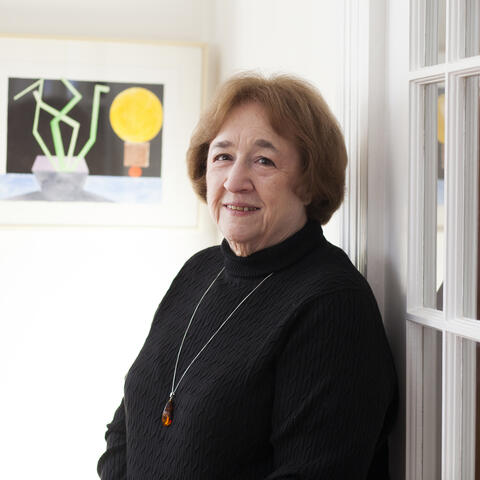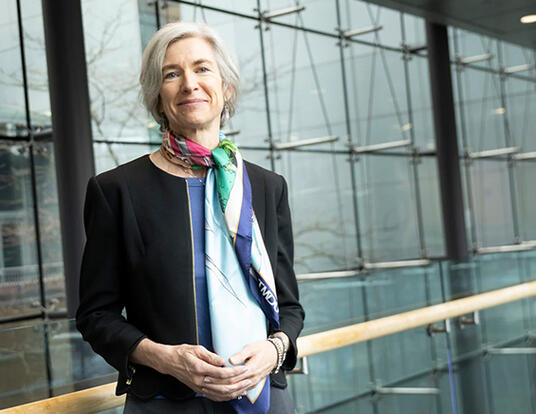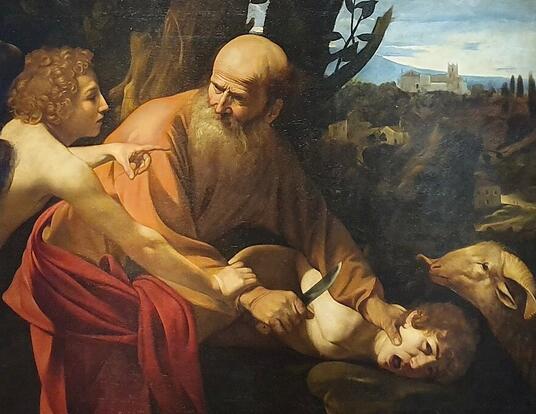Alumni Day 2018: An Intellectual Return
Harvard faculty and GSAS alumni share big ideas and new innovations at Alumni Day 2018
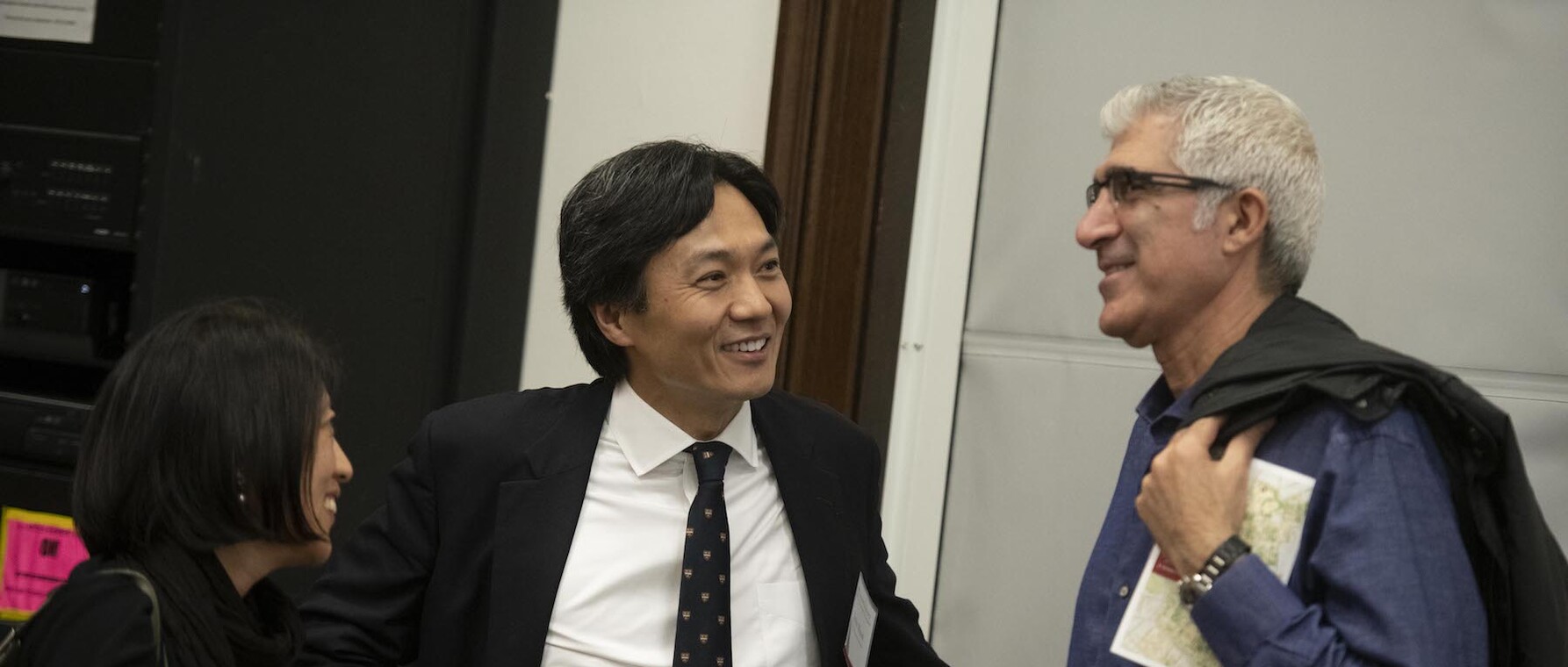
Where can you find scholars of religion and ethnomusicologists mingling with economists, neurobiologists, and chemists? Where else but GSAS Alumni Day, an annual gathering of alumni and faculty that celebrates intellectual achievement at Harvard and beyond.
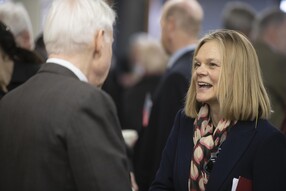
During the plenary session at this year’s Alumni Day on April 14, GSAS Interim Dean Emma Dench, the McLean Professor of Modern History and of the Classics, thanked alumni “for the inspiration you give to young scholars coming into graduate life and into their fields, and for all you do inspire and mentor students.” Dench, who will remain on as dean beginning in July, also thanked outgoing GSAS Dean Xiao-Li Meng for the many advancements he made during his tenure, particularly his prioritization of professional development for students.
Dench called her term as interim dean a “listening year.” She outlined two of the key areas that she will focus on as dean: secondary fields and advising.
“I want students to take advantage of secondary fields, to use them to push the boundaries of their research,” said Dench. “This experience will also make our students excellent candidates for positions outside of academia.”
Dench also intends to launch an advising project designed to generate and propagate best practices. According to a recent survey of GSAS students, more than 90 percent of students find their advising is good. But Dench believes it is important not to forget the 10 percent who are not satisfied. “Not so good advising jeopardizes brilliance,” she said. “My sense is faculty are on board with this: Everyone wants to be a better advisor.”
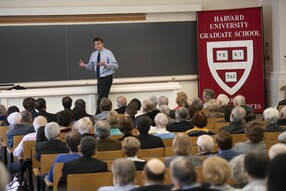
The keynote address was delivered by Michael Puett, the Walter C. Klein Professor Chinese History and Anthropology. In “Religion and Politics Revisited,” Puett interrogated the idea that separating politics from religion makes for a more tolerant society. “The development of a secular world removes rituals to understand the ethos of a religion without returning to the divine, essentially wiping away what makes a religious tradition,” Puett said.
While attempts to create a more secular world in Europe and America seemed to create a more tolerant world, the rise of fundamentalist religions speaks to the opposite. “When we think about the resurgence of religion, we think of fundamentalist movements becoming intensely powerful, calling for a return to an earlier time,” he said. “These are people who reject our attempt to build a tolerant secular society and want to return to a more traditional world.”
In “Looking Towards Our Energy Future,” Theodore William Richards Professor of Chemistry Cynthia Friend provided an overview of energy science and her work to develop tools to address energy security and climate change. “Solar energy is ubiquitous far greater than other sources of energy,” she said. “But how can we use it efficiently and cost effectively?” The answer, Friend believes, in part lies in designing better catalysts that can be used in storing energy electrochemically. In her lab, she and her graduate students working to design catalysts and predict their behavior using theory and experiment. She credits her students with advancing this important work. “Teams of graduate students make research happen, and they go on to make important advancements and contributions later,” she said. “They are the life blood of our research.”
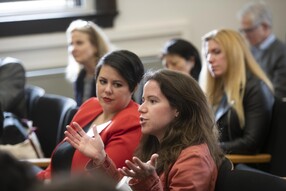
In "The Economics of Modern Latin America," Felipe Larraín, PhD '85, and Chile’s minister of finance, detailed the challenges that Latin American countries face, despite being rich in natural resources. When revenue increases during the good times, Larraín explained, every politician has a clever—or not so clever—idea for how to spend the surplus. But excessive spending in the good times is hard to reverse in the bad times. “What is needed are strong fiscal and monetary institutions, such as an autonomous central bank, and fiscal rules that specify spending out of long term, not current, revenue.”
Does Islam have a marketing problem? In “Whose Islam Is It Anyway?” Ali Asani, PhD ’84, Professor of Indo-Muslim and Islamic Religion and Cultures, explained how he once led a group of Harvard Business School alumni on a trip to Dargah of Muin ad-Din Chishti, a beautiful and culturally significant Muslim shrine in Rajasthan, India.
An American CEO on the trip came up to Asani and said “You have a marketing problem. If this is Islam, why don’t I know about it?”
Asani suggests that the problem lies with religious illiteracy: People who lack the tools to understand the complex and multi-sensory nature of religious practice, scripture, and belief can easily stereotype and dismiss entire communities.
During “There and Back Again: A Long Road to Axonal Survival,” Professor of Neurobiology Rosalind Segal spoke about her research on touch sensation. Segal shared how novel treatment could prevent the degeneration of the axons that transmit information from the skin to the sensory neurons adjacent to the spinal cord. “Our research asks: How do these signals regulate survival and maintenance of these neurons?”
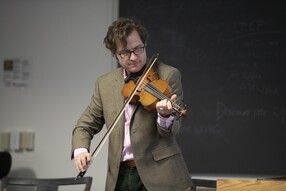
Kay Kaufman Shelemay, G. Gordon Watts Professor of Music and Professor of African and African American Studies and Panayotis F. “Paddy” League, PhD ’17, teamed up for “Soundscapes: Teaching the World of Music.” Both Shelemay and League spoke about their research into the musical lives of migrants from Ethiopia and Lesbos, respectively. “You can see in these two case studies that in these diasporas, there are multiple musical traditions that cross each other,” said Kaufman Shelemay, “Our goal is to explore the deep connections and broad impact that musical creativity and performance have on social and cultural life.”
Russia has undergone many changes since the “simpler” times of the tsars and the Bolshevik Revolution, said Timothy Colton, PhD ’74, and the Morris and Anna Feldberg Professor of Government and Russian Studies, in “Perspectives on Putin’s Russia.” Colton detailed the complicated development of the Soviet Union and its ultimate dissolution, which led to a great depression plus. Putin sees himself as repairing damage others have done to the country, and while his pride in the Soviet Union is clear, he is clearly critical of the soviet system because of its neglect for Russia’s “Russianness.” Putin has created stability, but constructed it painfully, at a cost many would find unacceptable. Most Russians will sing his praises, but any country with one leader and no successor will have problems.
Photos by Tony Rinaldo
Get the Latest Updates
Join Our Newsletter
Subscribe to Colloquy Podcast
Simplecast Stitcher


